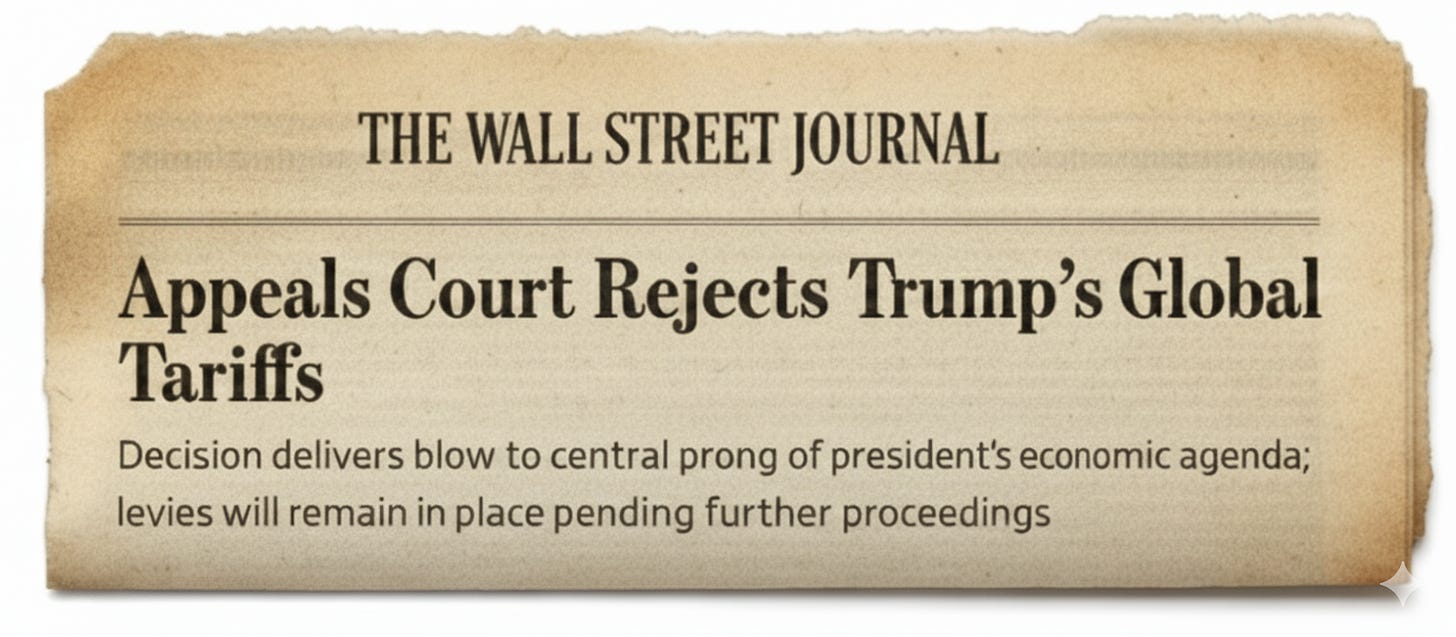The 7-Judge Tariff Ruling That's Actually Bullish
Why Friday's "Disaster" Could Spark October's Rally
The talking heads got it wrong. Again.
They're telling you stocks tanked Tuesday because of Friday's court ruling on tariffs. That America might have to "write checks."
If that were true, stocks would be soaring.
Let me explain what really happened—and why September's about to get interesting.
The Real Story Behind the Ruling
Friday evening, while most of America was packing for Labor Day weekend, the Federal Circuit Court dropped a bombshell.
7-4 decision. Trump's sweeping tariffs? Illegal.
The court said the president can ban imports during an emergency. He can regulate them. He can even prohibit entire categories of goods.
But he can't tax them without Congress.
It's like saying you can lock your door but you can't charge admission.
The logic is tortured. But that's not the point.
The point is what happens next.
Back in August, I warned about this exact scenario.
Called it three weeks before anyone else was paying attention. Said the courts would strike down Trump's "Liberation Day" tariffs because he'd gotten sloppy.
Using tariffs as political weapons. Slapping duties on Brazil because he didn't like their politics. Hitting countries with surcharges for buying Russian oil.
That's not trade policy. That's economic sanctions dressed up as taxes.
And somebody should've told Trump this would torpedo his entire agenda.
What Wall Street Missed
The court didn't kill all tariffs. Just the ones Trump imposed using emergency powers.
Steel tariffs? Still standing. Auto tariffs? Intact. Copper duties? Untouched.
Those were authorized by specific Congressional statutes. They're fine.
But the baseline 10% tariff on everything? The "reciprocal" duties? The special surcharges on Canada, China, and Mexico?
Gone. Unless the Supreme Court saves them.
The court focused on one word that wasn't in the law: "tariff."
Congress gave the president power to regulate imports during emergencies. To ban them. To nullify transactions involving them. To control them in pretty much every way imaginable.
But they never used the word "tariff."
And that omission? That's what 7 judges hung their hats on.
Never mind that tariffs are obviously a form of regulating imports. Never mind that if you can ban something entirely, surely you can tax it instead.
The court said no. Congress has to say the magic word.
Wall Street knows this. That's why they're not really panicked.
The Real Reason to Watch September
The real fear isn't about tariffs disappearing. It's about something else entirely.
September is the worst month for stocks going back a hundred years.
Not October. Not March. September.
And this year, we're walking into it with:
A massive legal battle over trade policy
The Fed still playing games with rates
China ready to retaliate
And markets near all-time highs
The setup is perfect for a September swoon. The tariff ruling is just the excuse.
But let’s flip the script—what if this isn’t the start of a crash?
The Melt-Up Nobody Expects
If the Supreme Court upholds the lower court's decision, we don't get a crash.
We get a melt-up.
Think about it. Suddenly, import costs drop 10% across the board. Margins expand. Inflation pressures ease. The Fed has room to cut.
Every company that imports anything—which is basically every company—gets an instant profit boost.
The market would rip higher so fast it'd make your head spin.
Trump's lawyers are already screaming about "1929-style" consequences if the tariffs fall.
They sent the court a letter warning of "catastrophic consequences." Said we wouldn't be able to pay back "trillions of dollars" to other countries. Claimed it could trigger another Great Depression.
They're bluffing.
They know the real risk isn't economic collapse. It's political humiliation.
Trump built his whole second-term agenda on these tariffs. They fund his tax cuts.
They're his leverage in trade talks. They're his big stick for foreign policy.
Without them? He's just another president begging Congress for money.
And Congress doesn't like to share power.
Why This Supreme Court Case Matters
The White House is betting the Supreme Court's conservative majority will save them.
Maybe they're right. The high court has sided with Trump on plenty of emergency actions before. Immigration. Military funding. COVID policies.
But this is different.
This isn't about liberal versus conservative. It's about who gets to tax—Congress or the president.
And even conservative justices care about that line.
They've got this thing called the "major questions doctrine." Used it to strike down Biden's student loan forgiveness. His eviction moratorium. His vaccine mandates.
The principle? When a president claims sweeping new powers from old laws, courts should be skeptical.
Trump's tariffs are the definition of a major question.
So watch the Supreme Court docket. Mid-October is the deadline for Trump to appeal.
If they take the case, expect volatility through spring.
If they decline? Or if they uphold the ruling?
That's when you'll see the real fireworks. Not down. Up.
Because markets don't crash when uncertainty disappears.
They crash when everyone realizes they were wrong about what's coming next.
And right now, everyone's betting on chaos.
What If They're Wrong?
What if the death of these tariffs isn't the disaster Trump's lawyers claim?
What if it's actually the catalyst for the next leg higher?
The talking heads won't tell you that story. Too complicated. Doesn't fit the narrative.
But that's exactly why it might be true.
Want to know which names benefit most if these tariffs fall? I'll show you tomorrow.
Trade smart. Until tomorrow,
Josh Belanger



